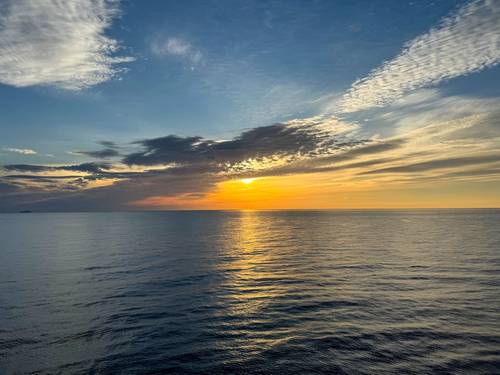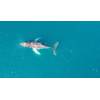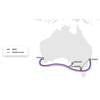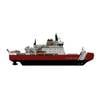Climate Change Threatens Mediterranean Sea
A recent study led by GEOMAR Helmholtz Centre for Ocean Research Kiel has investigated how strongly marine and coastal ecosystems in the Mediterranean Sea are at risk from climate change, even under comparatively moderate additional warming.
Temperatures in the Mediterranean are currently rising to record levels, with temperatures up to 28°C or even higher. With an average water temperature of 26.9°C, July 2025 was the warmest since records began for the Mediterranean Sea, according to the Copernicus Earth Observation Service.
Warming caused by climate change is considered – alongside stressors such as overfishing, pollution, and habitat destruction – a major factor threatening marine and coastal habitats. “The consequences of warming are not only projections for the future, but very real damages we are witnessing now. The continuing rise in temperatures, sea level and ocean acidification cause severe risks for the environment in and around the Mediterranean Sea,” says Dr. Abed El Rahman Hassoun, Biogeochemical Oceanographer at the GEOMAR Helmholtz Centre for Ocean Research Kiel.
Together with Prof. Dr. Meryem Mojtahid, Professor of Paleo-Oceanography at the University of Angers and at Laboratory of Planetology and geosciences (France), they have investigated the effects of climate change on marine and coastal ecosystems in the Mediterranean region. The projections of the meta-study are based on recognized climate scenarios of the IPCC (Intergovernmental Panel on Climate Change).
The research team analyzed 131 scientific studies on Mediterranean published up to August 2023. For the first time, this resulted in a so-called 'burning ember' diagram for Mediterranean marine and coastal ecosystems – a risk assessment tool originally developed by the IPCC.
The Mediterranean Sea – similar to the Baltic Sea or the Black Sea – is a semi-enclosed sea and connected to the global ocean only through the Strait of Gibraltar. As a result, the Mediterranean Sea is warming faster and acidifying more strongly than the open ocean.
Between 1982 and 2019, the surface seawater temperature already increased by 1.3°C, while the global increase was only 0.6°C. Therefore, the IPCC also refers to the Mediterranean Sea as a 'hotspot of climate change'.
Also, scientists consider it as a natural laboratory because it reacts faster and more strongly to climate pressures than the open ocean, while at the same time concentrating multiple drivers and stressors in a relatively small, well-observed system. “What happens in the Mediterranean often foreshadows changes to be expected elsewhere, so the Mediterranean Sea acts like an early warning system for processes that will later affect the global ocean,” says Hassoun.
If international climate protection targets are met in the coming years, some environmental changes could still be slowed. Two IPCC scenarios – known as RCPs, or Representative Concentration Pathways – can be used to illustrate this: In a medium emissions scenario (RCP 4.5), emissions will stabilize over the next few years thanks to moderate climate policies. Even in this case, the Mediterranean Sea is expected to warm by an additional 0.6 to 1.3 °C (compared to current values) in 2050 and 2100 respectively.
In contrast, the high emissions scenario (RCP 8.5) describes the “business as usual” path with continuously rising emissions. In this scenario, additional warming would likely range between 2.7°C and 3.8°C by 2050 and 2100 respectively. Such warming, together with sea level rise and ocean acidification, would have significant disruptions on ecosystems: seagrass meadows would be lost, coral reefs might witness significant damages, and severe chain reactions would occur in food webs.
“These scenarios show: We can still make a difference! Every tenth of a degree counts!” says Hassoun. “Political decisions made now will determine whether ecosystems in the Mediterranean Sea collapse, partially or totally, or remain functional feeding the ecosystem services they provide. At the same time, our study also shows that even with moderate climate protection and an additional 0.8°C warming, we must expect some consequences. Thus, our focus should be on minimizing the impacts as low as possible.”
The researchers examined a wide range of marine ecosystems: from seagrass meadows to fish and macroalgae, as well as marine mammals and turtles. Warming and acidification of the Mediterranean are altering entire communities. Plankton species are shifting, and toxic algal blooms and bacteria are occurring more frequently.
With an additional warming of 0.8°C, seagrass plants such as Posidonia oceanica would decline massively and disappear completely by 2100. Seaweed species such as Cystoseira would also decline, while populations of heat-loving invasive algae could increase.
Fish stocks are under pressure from +0.8 °C as well: they could shrink by 30 to 40%, shift northwards, and make room for invasive species such as the lionfish, which threatens biodiversity.
Corals, probably due to their long evolutionary history, are relatively more resilient than other ecosystems, as they are at moderate to high risk from +3.1 °C.
Data on marine mammals and sea turtles are limited, but changes in feeding grounds, migration behavior, and energy budgets are likely to occur.
Rising sea levels increase coastal erosion and thereby threaten the nesting sites of sea turtles – more than 60% could be lost. Even at an additional warming of just +0.8 °C, the risk rises significantly: sandy beaches and dunes are particularly endangered, and rocky coasts also lose habitat and biodiversity, although they are somewhat more resilient.
For several ecosystems, scientific studies for the assessment of risks are still limited. There are only few projections for deep-sea habitats, salt marshes, macroalgae, and megafauna. Significant geographical gaps also remain, particularly in the southern and eastern Mediterranean, leading to a possible underestimation of risks in underrepresented countries.
Moreover, long-term observations that address multiple stressors such as pollution and invasive species simultaneously are lacking. Addressing these gaps will require stronger interdisciplinary research efforts and expanded monitoring, especially in underrepresented regions.


















 December 2025
December 2025



